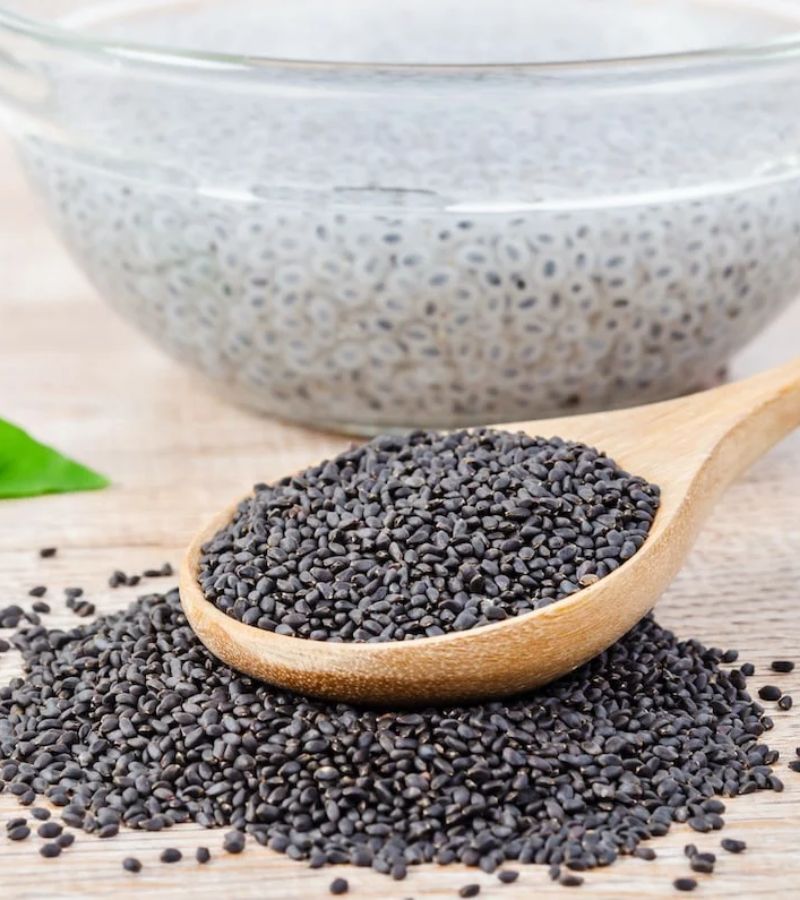Sabja Seeds or Sabza Seeds (Tukh malanga / Basil seeds)
₹60.00 – ₹600.00Price range: ₹60.00 through ₹600.00
- Sabja seeds are a rich source of fibre, with 100g containing 38g of dietary fibre.
- Sabja seeds are low in calories, with only 21 calories per 100g serving.
- Sabja seeds may help improve skin health and reduce the risk of skin disorders.
- Sabja seeds are gluten-free, making them suitable for individuals with gluten intolerance or celiac disease.
- Sabja seeds have been used as a natural remedy for respiratory conditions like asthma and cough.
| Weight | N/A |
|---|
Basil seeds, also known as Sabja seeds or Tukh Malanga or Tukmaria seeds, are popularly used in Unani and Ayurvedic and traditional medicine practices. Here’s a breakdown of their health benefits, uses, and potential side effects:
Health Benefits:
- Rich in Nutrients: Basil seeds are a good source of several nutrients, including fiber, protein, vitamins, and minerals like iron, calcium, and magnesium.
- Hydration: When soaked in water, basil seeds form a gel-like substance around them, which helps to keep the body hydrated. This makes them a popular choice during hot summer months.
- Weight Management: The high fiber content in basil seeds can promote a feeling of fullness, reducing appetite and aiding in weight management.
- Digestive Health: Basil seeds have been used traditionally to treat digestive issues like bloating, constipation, and indigestion due to their fiber content.
- Cooling Effect: In Ayurvedic medicine, basil seeds are believed to have a cooling effect on the body, making them beneficial for reducing body heat during hot weather.
- Antioxidant Properties: Basil seeds contain antioxidants that help to neutralize harmful free radicals in the body, reducing oxidative stress and inflammation.
Uses:
- Beverages: Basil seeds are often added to beverages like falooda, sherbets, and lemonades for their unique texture and health benefits.
- Desserts: They can be used as a topping for desserts like puddings, ice creams, and yogurt.
- Salads: Basil seeds can be sprinkled over salads to add crunch and nutrition.
- Smoothies: They can be blended into smoothies for an added nutritional boost.
Side Effects:
While basil seeds are generally safe for most people when consumed in moderation, there are a few things to consider:
- Choking Hazard: Basil seeds swell and form a gel-like coating when soaked in water. If consumed dry, they may swell inside the throat and cause choking. It’s important to soak them in water before consuming.
- Allergic Reactions: Some people may be allergic to basil seeds, experiencing symptoms like itching, rashes, or difficulty breathing. If you have a known allergy to basil or other similar plants, it’s best to avoid basil seeds.
- Pregnancy and Breastfeeding: There’s not enough reliable information about the safety of consuming basil seeds during pregnancy and breastfeeding, so it’s best to avoid them during these times.
Always consult with a healthcare professional before adding basil seeds or any other supplement to your diet, especially if you have any underlying health conditions or concerns.
TIMEFRAME FOR SHIPMENT AND DELIVERY
- The Products are shipped the same day or next day of receiving the order on the Website except in case of public holidays.
- The Products are delivered within an estimated period of 5-10 working days from receiving the order.
SHIPPING AND DELIVERY CHARGES
- Delivery within Hyderabad ₹100 for 1kg to 10kg
- Delivery out of Hyderabad ₹40 per kg
- The Company provides paid shipping on all orders across India. The Company charges shipping or delivery from the Users with regard to their orders.
CUSTOMER SUPPORT
Any queries or grievances relating to the shipment and delivery charges of Products as per this Policy may be directed to the Company’s customer support team who can be contacted at the below mentioned details:
CONTACT DETAILS:
Customer Support Email:- [email protected]
Customer Support Number:- +91-90591 87300


